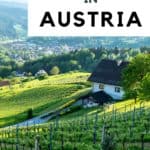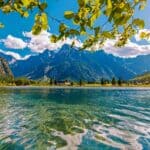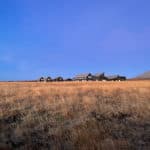Interested in slow travel in Austria? Here’s how you can embrace the new trend that elevates old ideas. Through the city of Graz, let us introduce you to the joy that is slow travel in Austria.
See also this article on summer in Austria and this guide to traditional Austrian food.
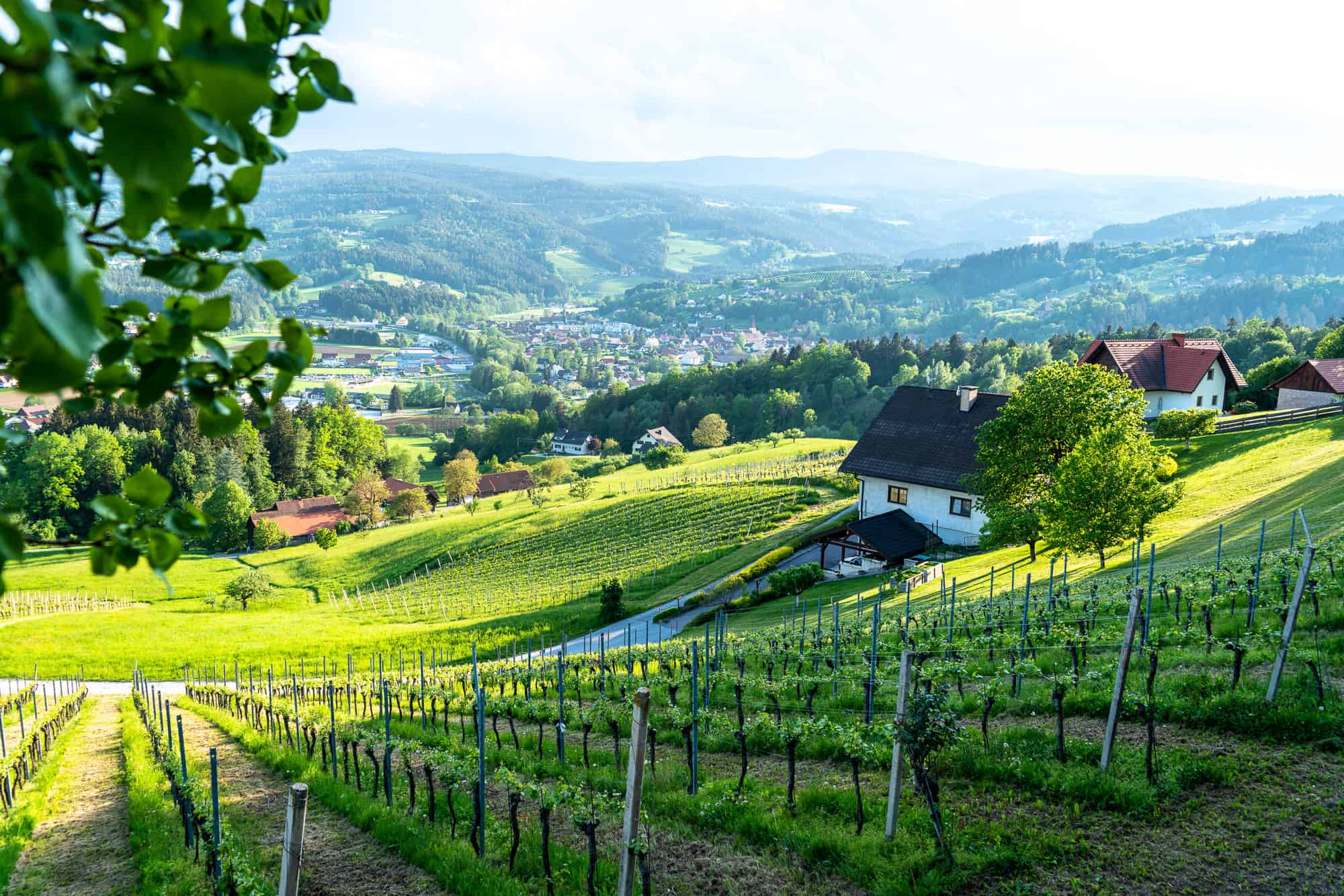
Slow Travel in Austria
The truth is, I rather like speed. No, not the drug side of things, of course.
I mean, I don’t like to hang about.
Queues, crowds and multilayered bureaucracy crawl beneath my skin like robotic spiders ready to seep pleasure away.
In those situations, fast is better. But when it comes to everything else, slow travel rules.
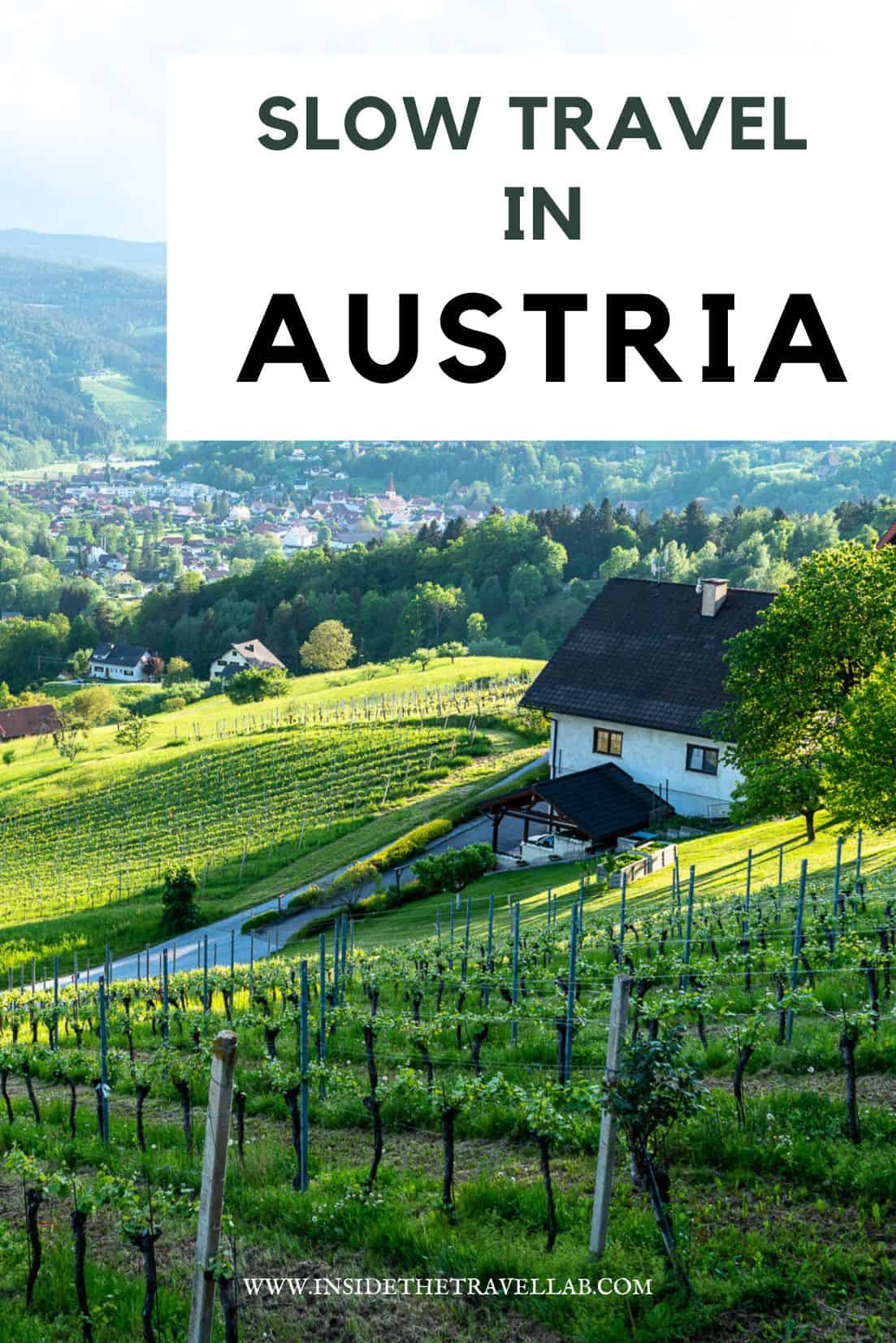
Why not bookmark this article on slow travel in Austria on Pinterest…
What is Slow Travel?
Let’s start with what slow travel is not. It is not all about speed.
It is about swapping frenzied, checklist travel which notches up sights at the expense of anything else, for slower, more connected, and more sustainable travel.
How Slow Do You Need to Go?!
But the slowness doesn’t have to be extreme. You don’t have to complete a pilgrimage on foot or create a fire with nothing but twigs and your bare hands (although, if you want to, that’s great! Go for it within the reasonable bounds of fire regulations and health and safety initiatives.)
Slow travel involves education and enjoyment, exploring new places, old customs and relishing and savouring the place you are in. It is the milk and honey version of travel instead of trash junk food.
If you don’t need to actually go slow or take a long time, where does the name come from?
Where Does the Idea of Slow Travel Come From?
Well, as with all these things, origin stories vary. But a huge influence comes from the slow food movement which began in Italy. As a protest to yet another McDonalds, the Slow Food Movement celebrates food traditions and processes that work in harmony with the environment and which treasure and pass on knowledge and flavour to locals and visitors alike.
For some of us, of course, none of this is new. It’s how we’ve always travelled – or always wanted to travel. It’s just nice that the travel trend world is starting to sit up and pay attention.
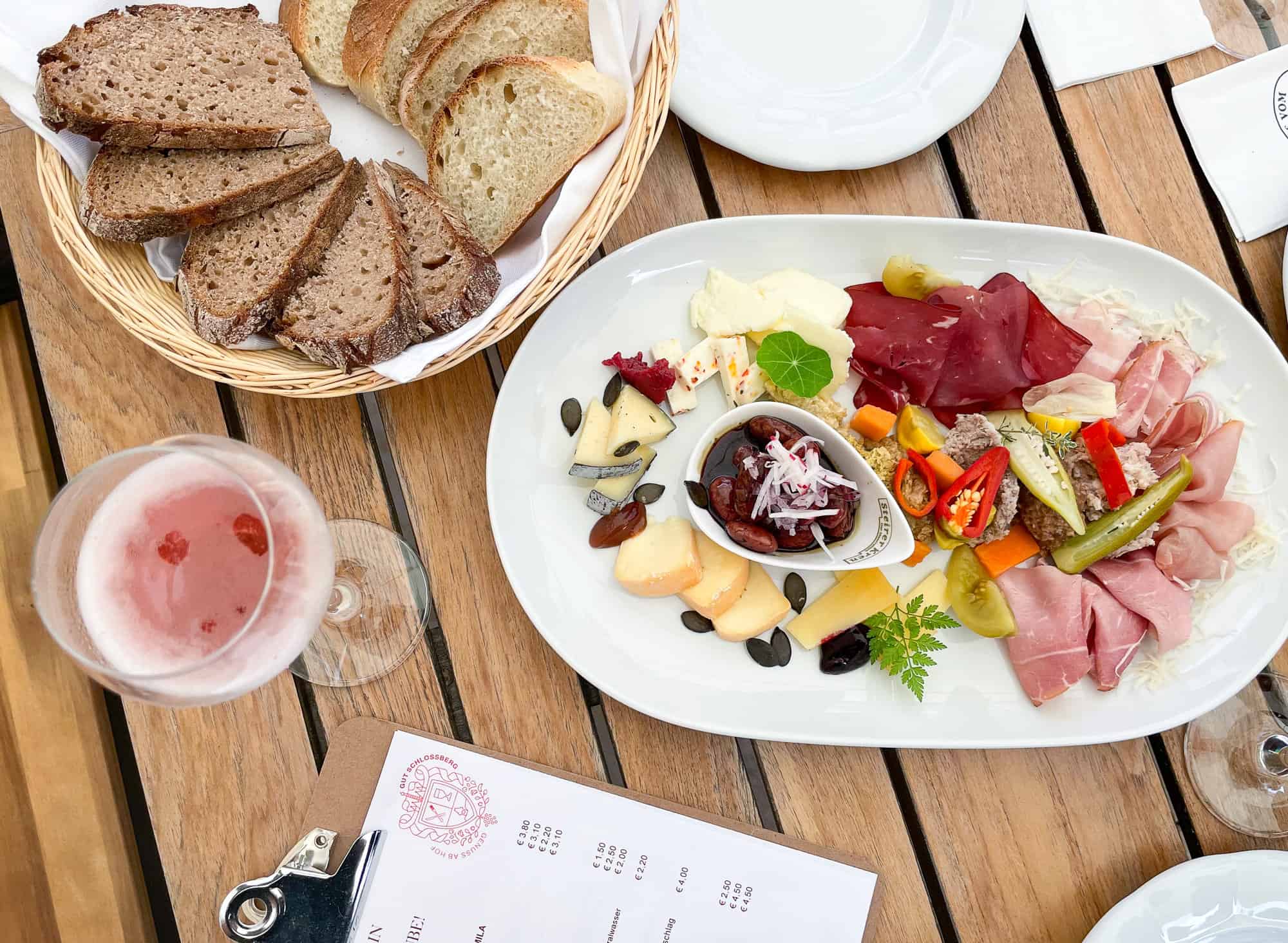
Slow down and taste the good stuff…
Why Slow Travel in Austria is Important
“It’s not about doing everything and being perfect. About you saving the world. It’s about taking whatever steps you can manage. Doing what you can from where you are with what you have. And every single step counts.” A spokesperson at Gramm, a sustainable shop in Graz.
I would go one step further. It’s not just about the concept of damage limitation.
Slow travel in Austria, or indeed anywhere, really is just another way to enjoy and enrich life more. For communities and generations to come, sure. But also, for yourself. You should be able to relish it. It should feel enjoyable. One of the many benefits of sustainable tourism is that it should be fun!
And one of the most enjoyable cities in Austria, or indeed Europe, is Austria’s second largest city, Graz.
So, when it comes to travel in Austria, let’s move beyond Vienna and Salzburg.
Let me show you how you can enjoy slow travel in Austria through a range of examples in Graz.
This is your slow travel guide in all its easygoing glory.
Want to keep travelling slowly? Check out our guide to 15 Beautiful lakes in Austria.
Disclosure: I visited Graz as a guest of Visit Graz in partnership with Captivate Digital Media on their Travel Deeper project. However, as ever, as always, I kept the right to write what I like. Life is so soul-crushing otherwise! Also, if you book or buy through any of the links on this page then I may earn a small commission at no extra cost to you. Cheers for that!
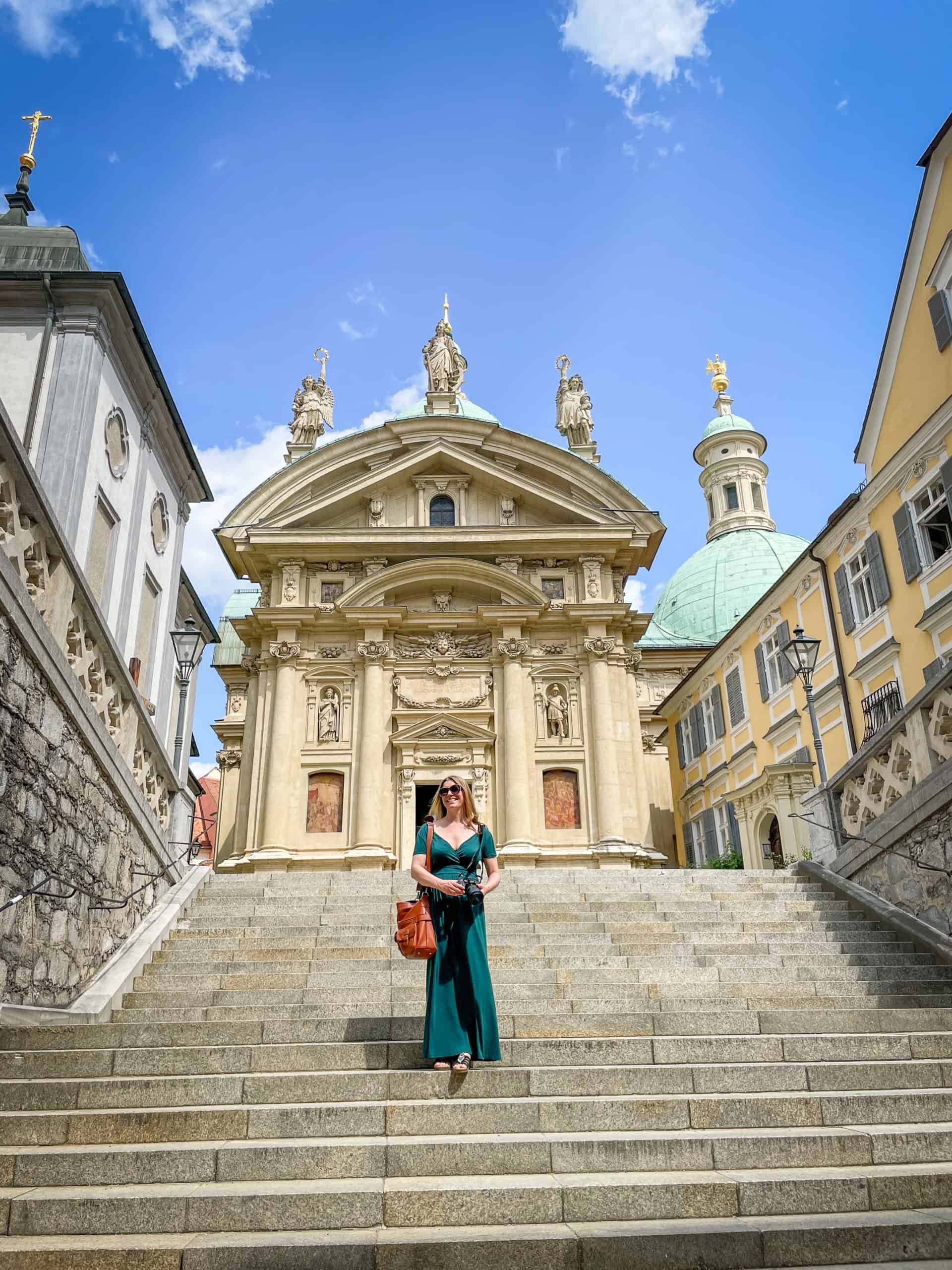
Graz. Europe’s most overlooked city.
Slow Travel in Austria: Graz as an Example
Pictures speak louder than words. So let’s move away from the abstract and into the travel inspiration.
Where is Graz?
Graz sits at the heart of the region of Styria in southeast Austria. It’s around three hours southwest of Vienna and fairly close to the border with Slovenia. The surrounding Styrian countryside includes some of the highest vineyards in Europe.
Slow Travel in Austria at a Glance
- Choose less well known cities
- Stay a while and explore local neighbourhoods
- Try to stay in locally owned hotels
- Try eating and drinking at locally run restaurants
- Learn about local food and traditions
- Explore the neighbouring countryside
- Try reducing the carbon footprint of your food: try vegan
- Consider your transport
- Take a local tour
- Make friends!
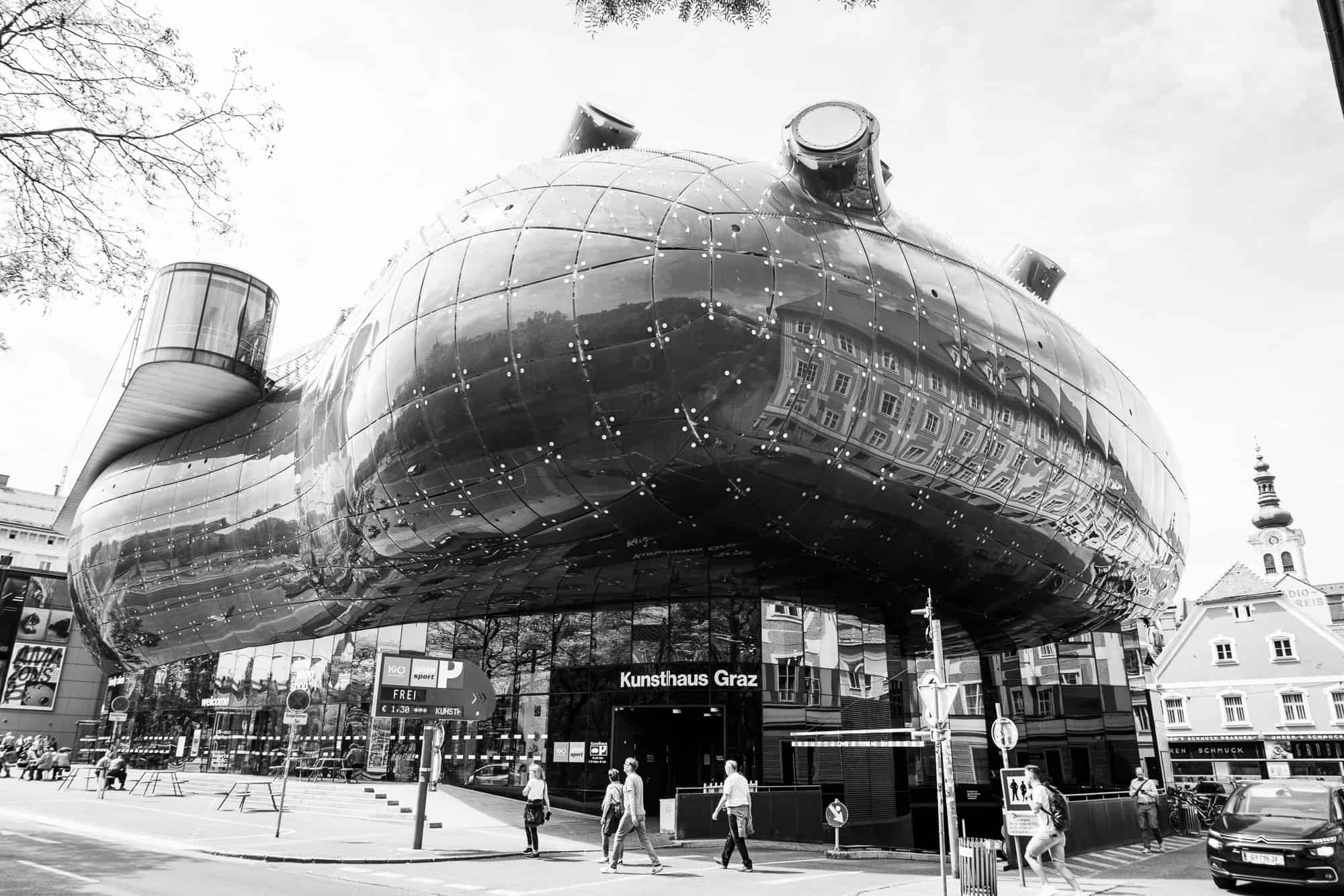
The Kunsthaus or Friendly Alien on the corner of Lend and Gries
Expand Your Neighbourhoods
Graz is a beautiful city. It’s the only German speaking city south of the Alps and has an ornate, Italian style feel in its UNESCO World Heritage Site Old Town.
But in addition to the classical beauties of the centre, you can cross the river to what used to be the wrong side of the tracks.
After all, a core part of slow travel in Austria involves moving beyond the central, tourist areas and taking part in life in other parts of a city.
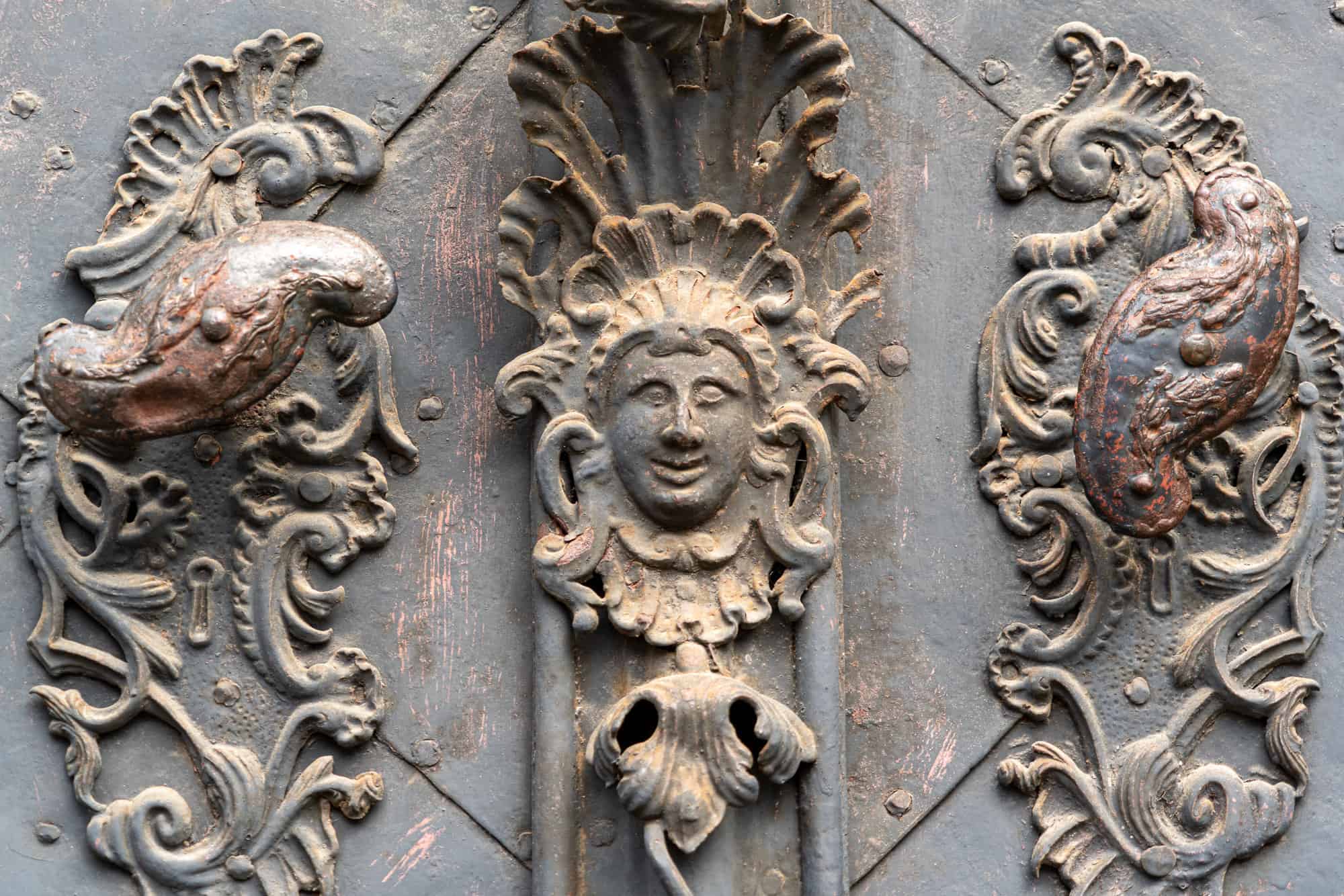
Take a tour with a local guide to find hidden details in Lend and Gries
Lend & Gries
The neighbourhoods of Lend and Gries are still part of the UNESCO World Heritage Site but they have a slightly grittier and definitely more modern, creative design focus.
The main road between between the capital Vienna and the major port at Trieste used to run through Lend and Gries during the long-reigning Habsburgs Empire.
As a result, the districts were hot beds for travellers. In the 18th century, Lend & Gries had 111 inns on the central road alone, compared to only 39 in the main Old Town. And each inn came with stables for horses.
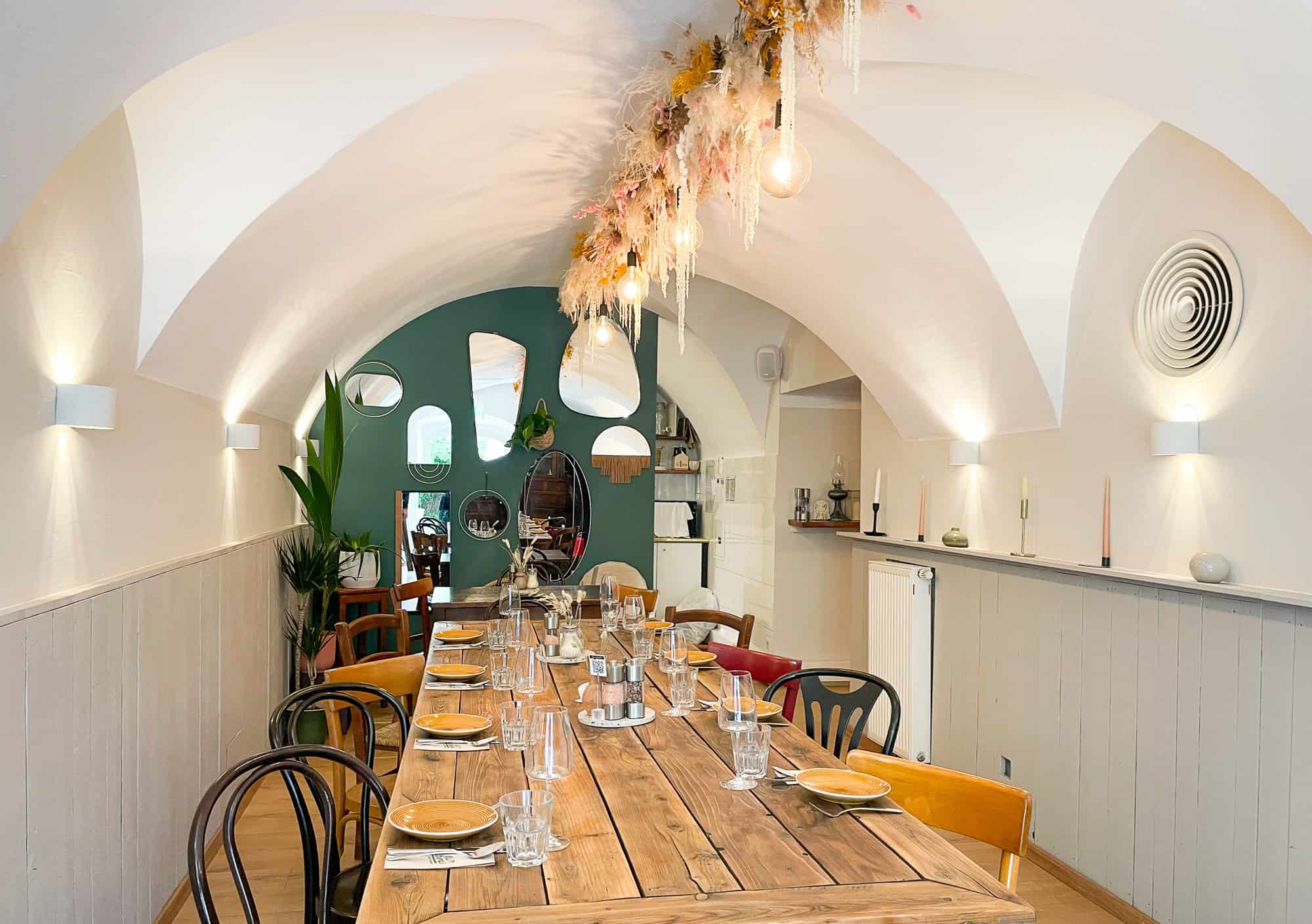
Inside a former stable – nicely renovated!
Today, many of those stables have been converted into design boutiques and restaurants and you can still look up and see the vaulted ceilings all around.
Some highlights of Lend and Gries are:
- Design shops brimming with quirky and creative ideas
- Boutique shops with hand crafted products made on site
- The historic Krankenhaus complex with its curious chapel with stained glass windows and monuments to sailors.
- The “Friendly Alien” or Kunsthaus, an art museum that changed the skyline of the city
- A busy farmers market that sells local produce in an unpretentious way
- New restaurants with ethical aims
- Community led projects that give a voice and a living to vulnerable people
- Wunder & Dauerwellen / Die Haarschneiderel – a cool retro barber
- And more!
You can find more detail further below and in the upcoming Graz itinerary. Subscribe to stay up to date!
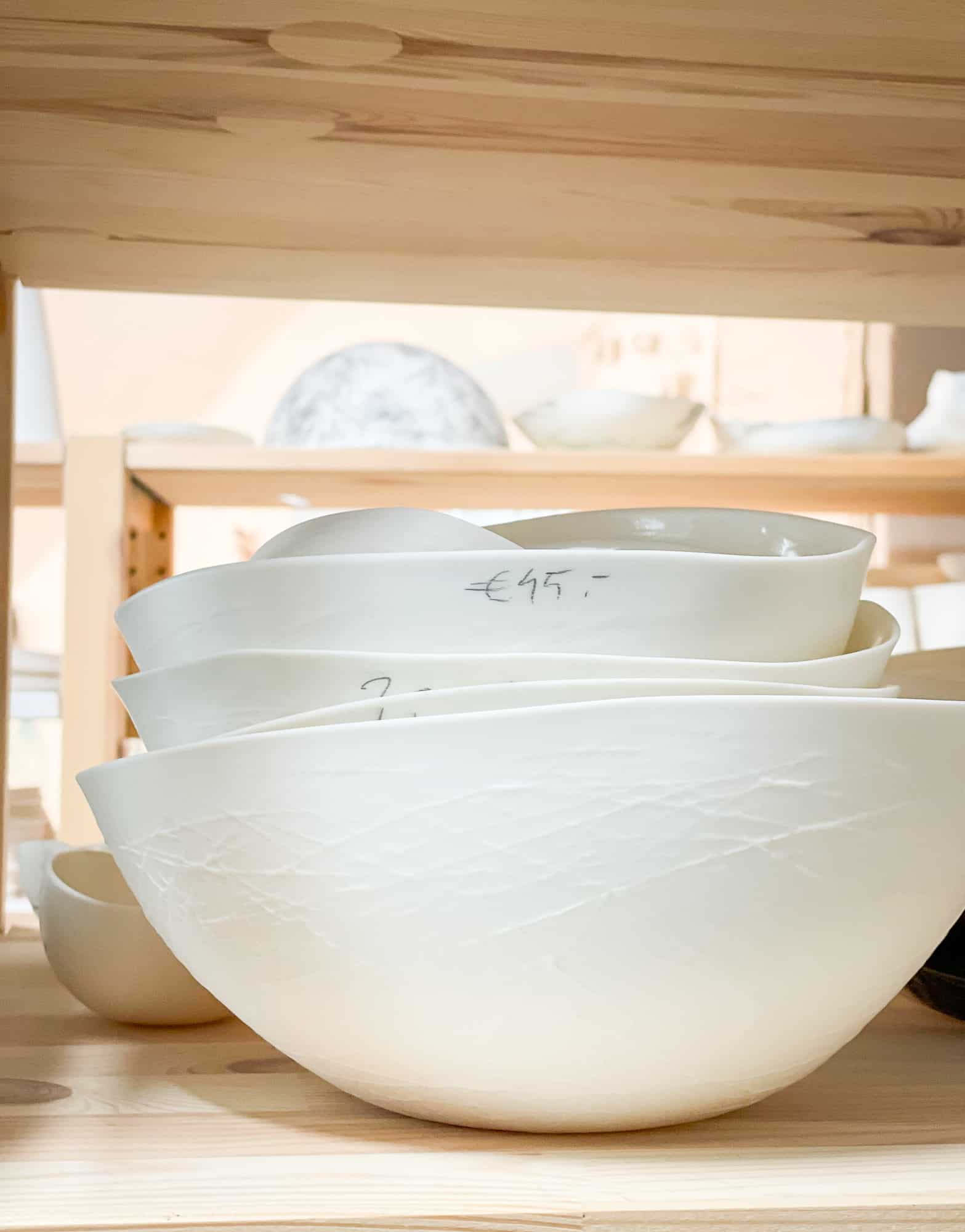
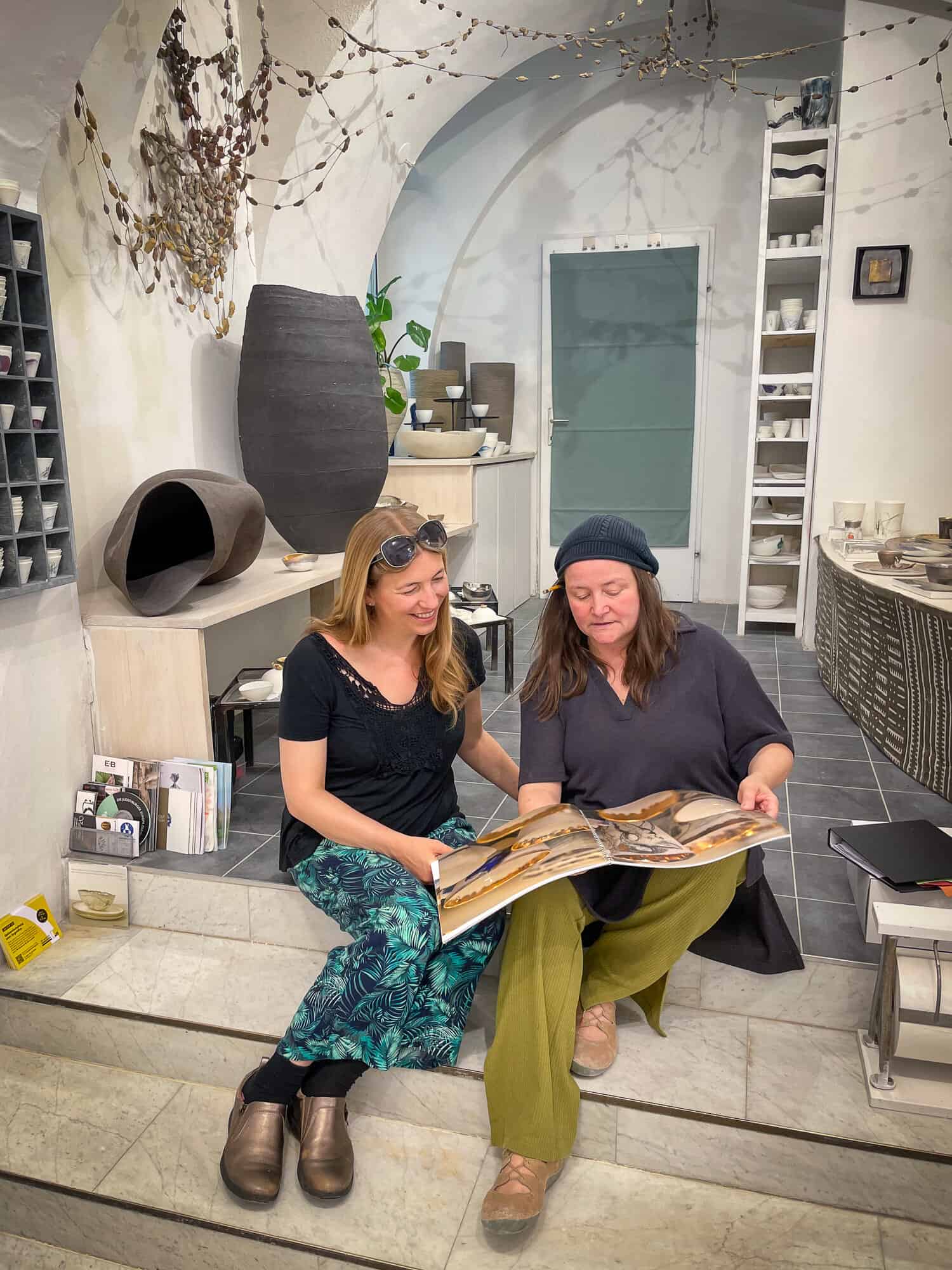
Chatting about ceramics in Da Loam
Slow Travel Ways to Shop
It took me years to realise it but, actually, shopping when you travel is a great way to learn more about an area and to meet its people. You’ll find that many people who run small shops are passionate about their subject and happy to talk to visitors and explain what it is they do.
Graz, with its huge focus on design, has more places than most. I found too many to mention but want to highlight these from Lend & Gries:
- Da Loam – the words also mean clay and this stunning shop in an historic building sells hand made bowls and pieces of art made on site.
- Kwirl – run by a former director at Vienna’s Museum of Fine Arts, Kwirl showcases design products from around Graz and around the world.
- Zerum – a fair trade fashion boutique.
- Tag.Werk – a social project that upcycles bags
- Herzlich – a community project supporting young people’s creativity
- The Murinsel – great design pieces that focus on Graz in the midst of the city’s stunning floating glass island.
- Offline retail – vintage clothes and upcycled accessories
- Managerie – design and a social space with aperol spritz and Eule beer.
Plus, you can cross the river and find the following closer to the Schlossberg:
- Häng Luis – recycled skateboard shop with sustainable fashion
- Das Dekagramm – zero waste market with bring your own containers
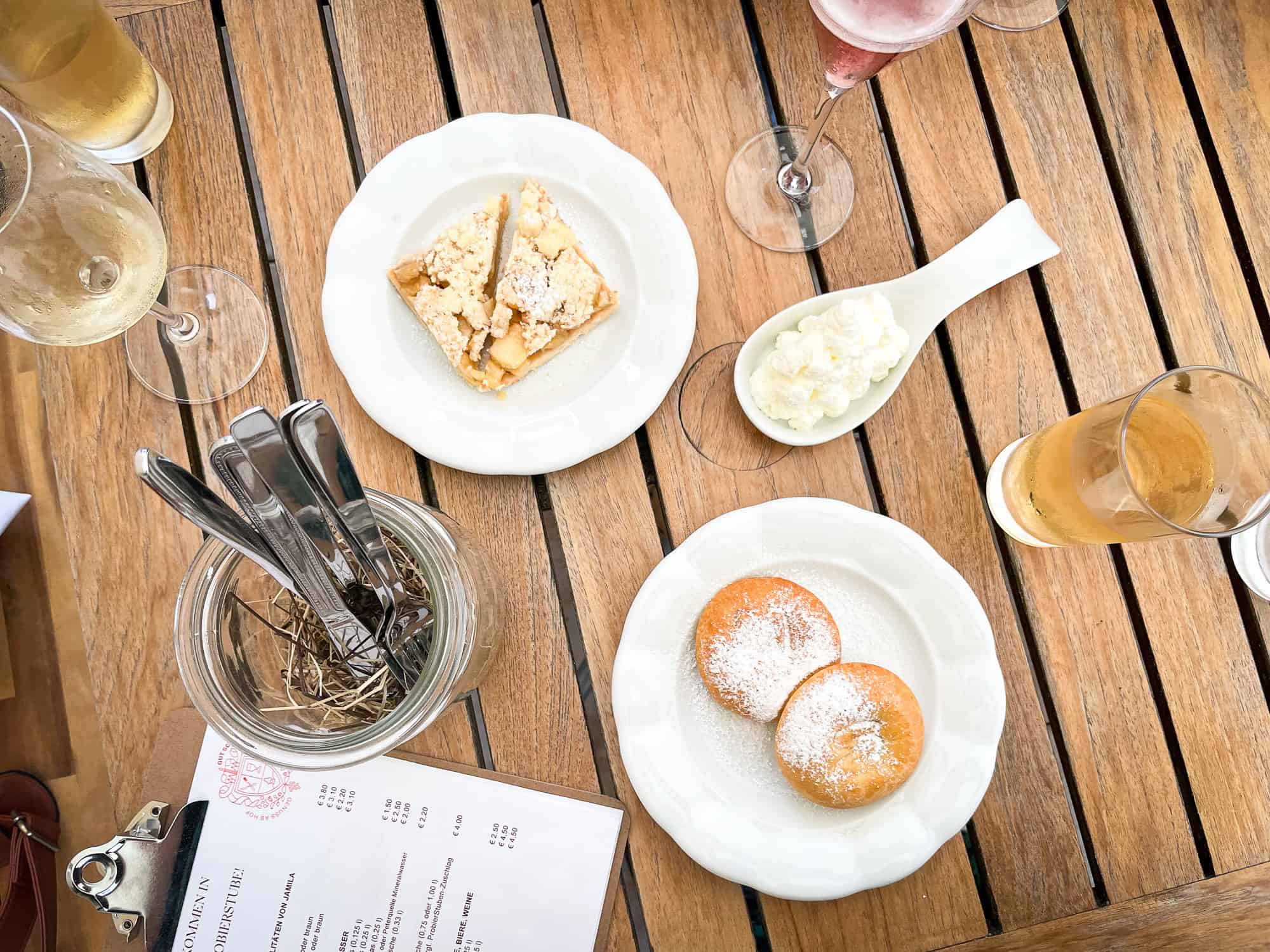
Slow travel in Austria involves thorough apple pie and cream research
Slow Travel in Austria Through Taste
Everyone has to eat, all over the world. Behind that seemingly unremarkable universal truth lives a whole category of great ways to understand an area, its land and its people.
The food scene in Graz is legendary and creative. Traditions like the long table, where you can dine beneath the stars in a UNESCO World Heritage Site, to casual cafes and mountainside picnics all form part of slow travel in Austria.
By branching out beyond the chains, you can treat your tastebuds to locally produced, sustainably sourced food in locally run restaurants.
What’s more, Graz has the highest concentration of vegetarian and vegan restaurants in Austria. So if you’ve ever been veggie-curious, you’ll have plenty of options to explore.
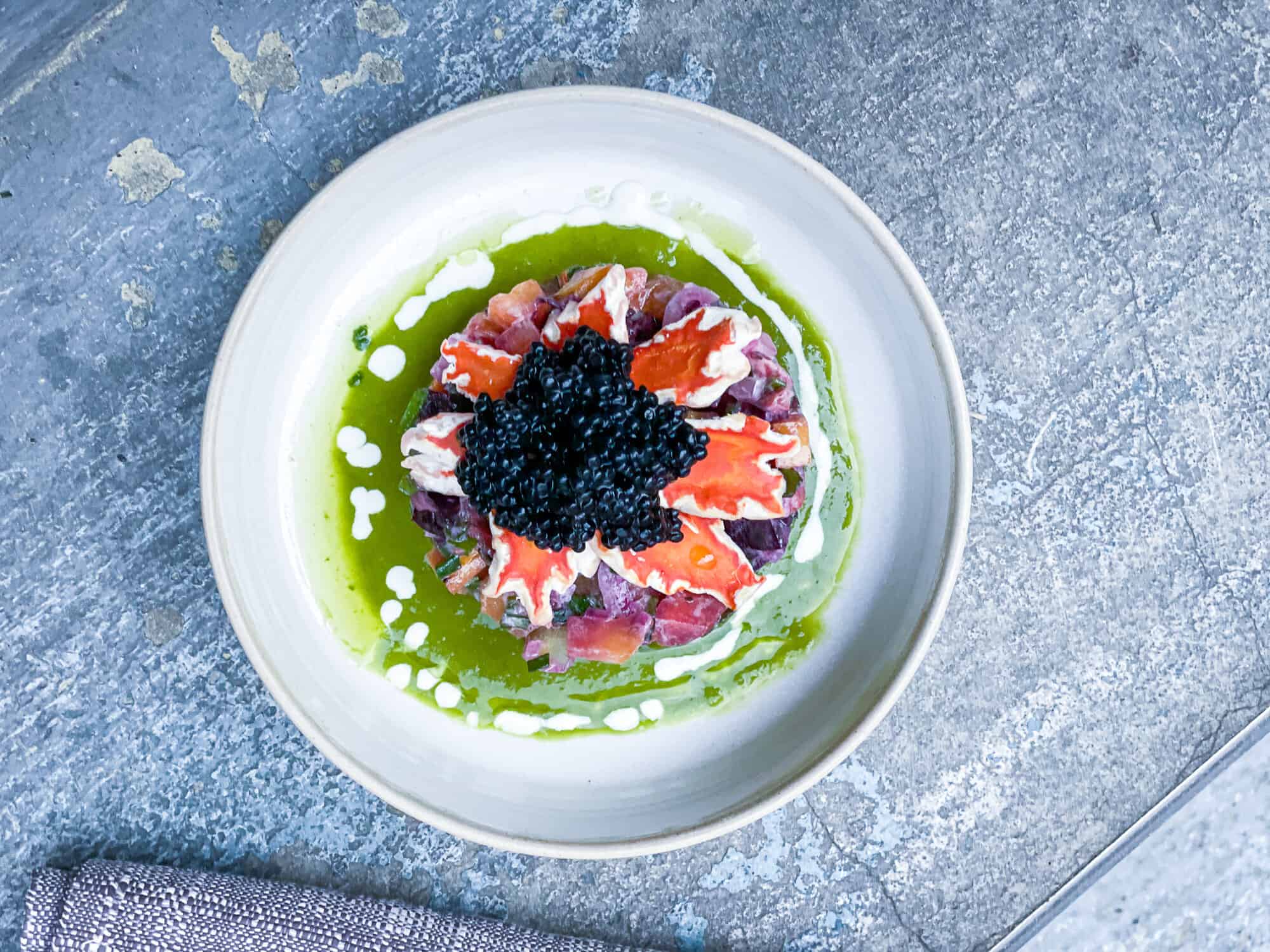
A meal at Gerüchteküche means you’ll never look at carrots the same way again…
Gerüchteküche: Fine Dining Veggies
Gerüchteküche will change the way you think about carrots forever. This innovative restaurant only uses plants in its kitchens. The menu changes according to the produce available at the market. And so as not to waste any food, you don’t always have a choice as to what you’ll get served.
But they’ve taken fine dining techniques and applied them to the humble veg. So carrots now look like brie and foam swirls reign supreme.
Try it to understand it. Bon app!
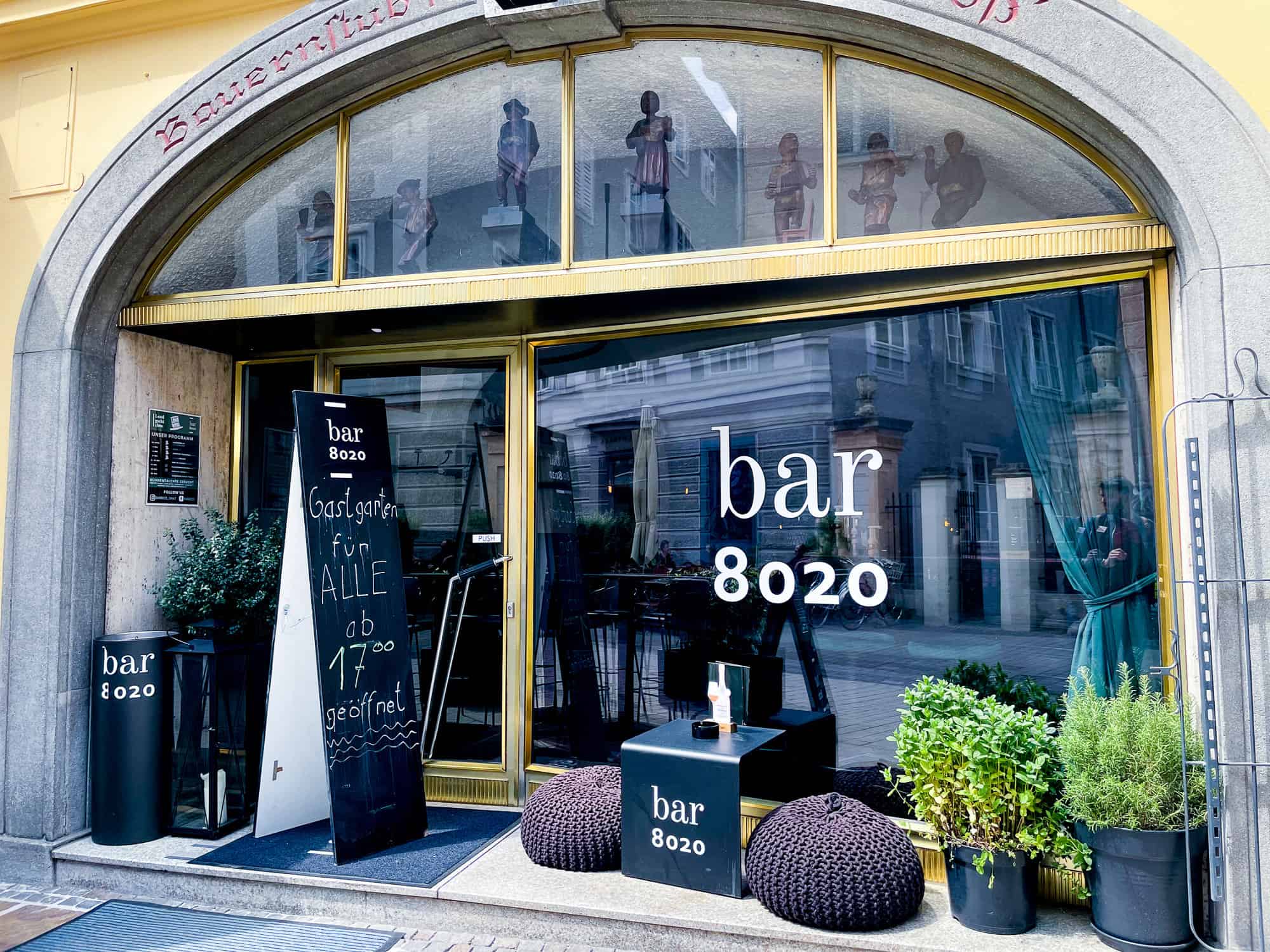
8020: the postcode of Lend and a former no go area
Cool Local Eateries
I’ve written a whole article on the best restaurants in Graz and her great food traditions here. But in the context of slow travel in Austria, I’d like to highlight these spots:
- The Omae Teekanne tea shop – run by two women with an interest in design. Look out for the art on old plates.
- Tribeka – unlike the NYC version, this one stands for Trink Besseren Kaffee. Or drink better coffee.
- Zotter – big local success story involving organic chocolate, five rounds of bankruptcy and meat and fish flavoured sweets (apparently.)
- The Linzbichler Süßwaren Laden – an impossibly cute chocolate shop nuzzled into the city wall and church at the same time. The owner will give you a quick personality quiz and then present with you with a personalised chocolate to match. Great fun, what’s not to like?!
- Der Steirer – a sleek spot which offers “Styrian tapas.” It’s the perfect way to try several different local dishes in a short space of time.
- Pane – a bakery and charitable initiative.
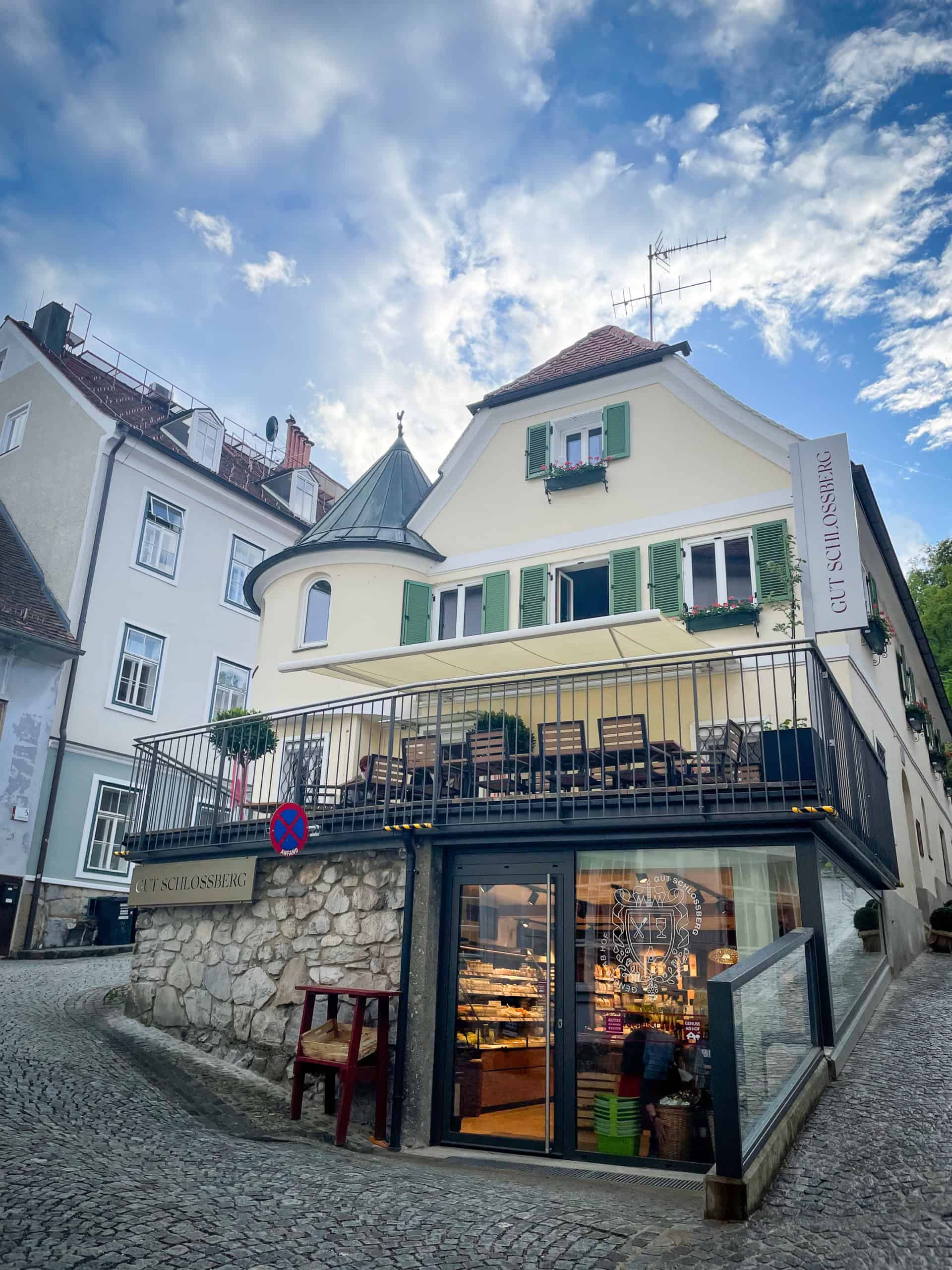
Gut Schlossberg: a haven for great local food.
Gut Schlossberg: A Deep Dive into Local Food
Just a short walk from the Clocktower itself, you’ll find a gorgeous gourmet food shop with a restaurant slash tasting zone upstairs. Specialties from over 120 Austrian farms and small businesses await. While produce comes from across Austria, around one third is Styrian and one third just from Graz itself.
If you’re organised, you can order in advance and pick up a picnic or barbecue set as well.
The tasting menu serves seasonal produce and tasting platters that include a mix of cold meats and cheeses.
Don’t miss the following:
- Rotschmirkaese – a red kind of brie
- Fasslkaese – cheese made in a barrel refined with rose wine
- The gently sweet poppy seed cake
- Apple crumble and cream to finish
- Rosy – an award-winning vermouth produced by a young woman in her 20s
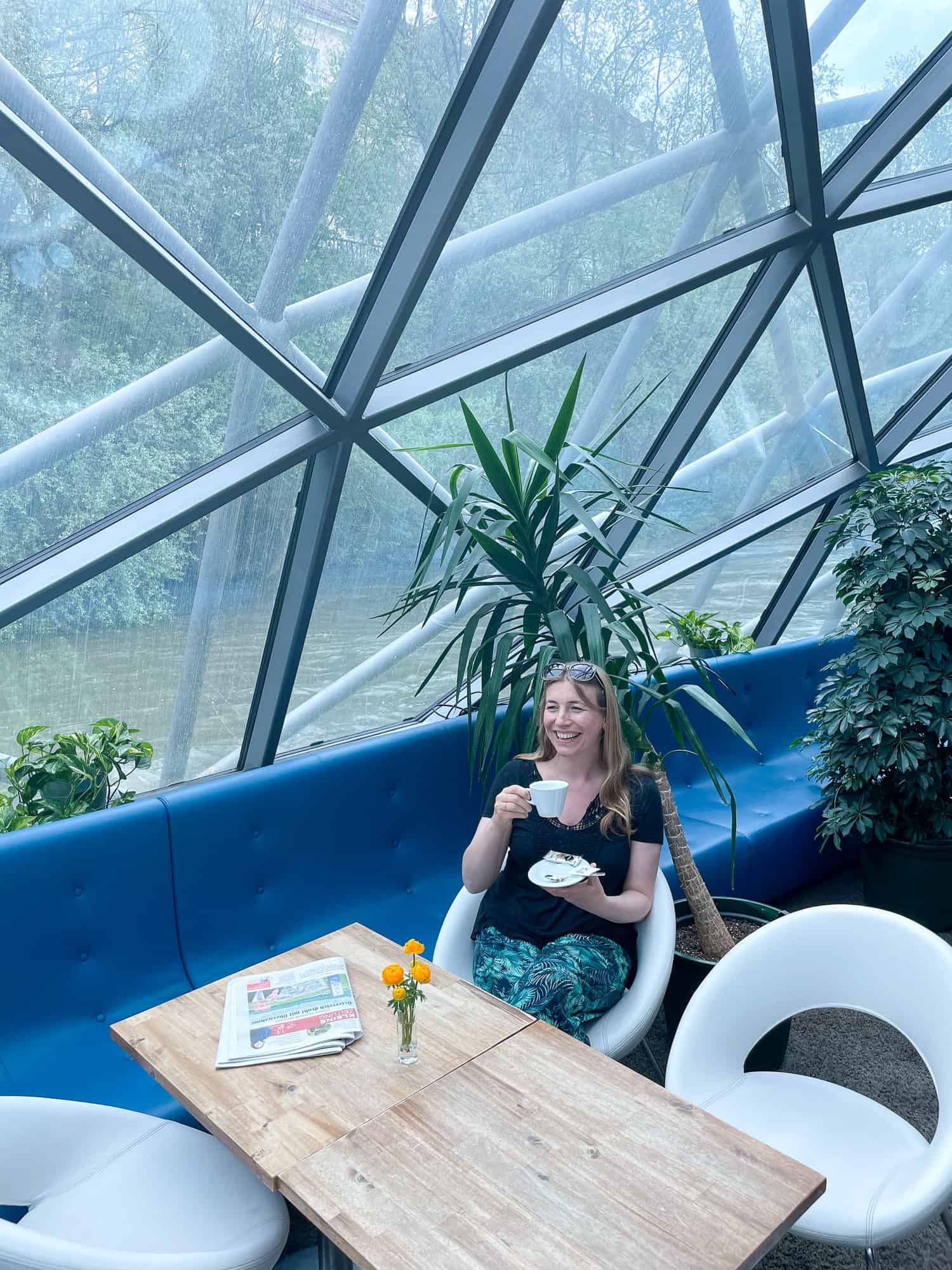
Testing out the cafe in the Murinsel…
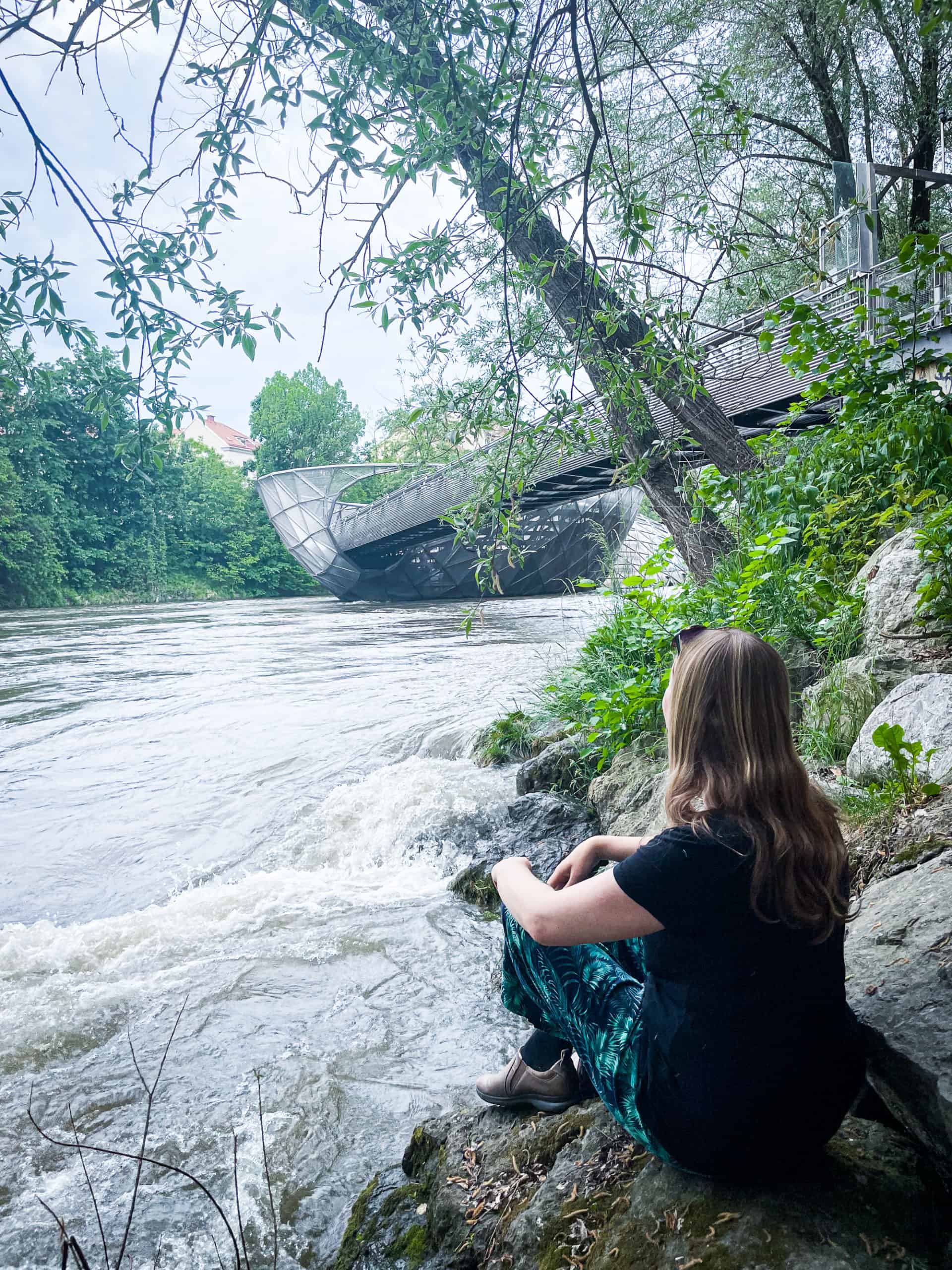
Taking in the view of the Murinsel in Graz
Take Yourself on a Treasure Hunt for Local Dishes
Really immerse yourself in slow travel in Austria and challenge yourself with this treasure hunt! See if you can track down these delicacies in Graz…
- Hafer – an oat drink powder
- Schlossbergkugel – chocolate balls
- Schilcher- a wine only produced in Western Styria
- Chocolate brandy
- Most – a carbonated cider

The stunning Styrian countryside…
Slow Travel in Austria: The Styrian Countryside
One of the biggest and best surprises about slow travel in Austria involves leaving the cities behind and stepping out into the countryside.
Only on my third or fourth trip to Vienna, for example, did I discover that it’s a really short journey from the city into glorious, sunbaked vineyards.
And Graz also has plenty of tricks up her slow travel sleeves.
Just a short journey into Western Styria, for example, provides all of these and more:
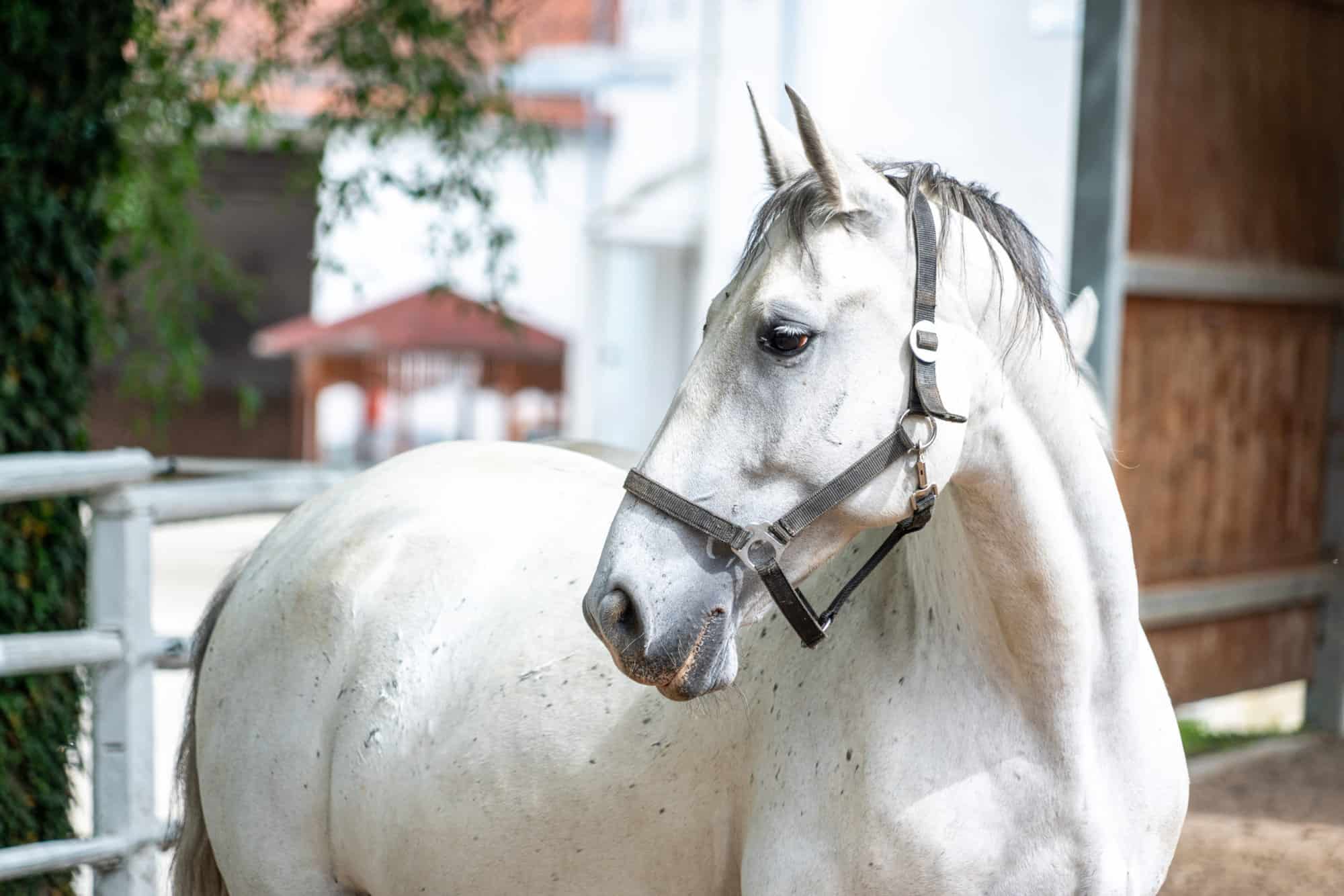
The Lipizzaner Horses
In the small town of Piber, the greatest and grandest horses in Austria have a home. The nearly white Lipizzan horses of the Vienna riding school fame are born here, nurtured here and retire here. Originally, this took place in Lipizza in Slovenia but the shifting borders and rulers of European history meant that the stables had to be relocated to Graz, although the name remained.
You can visit the stables and learn about the breeding and dressage programmes and even travel back in time with a horse and carriage ride through the rolling green hills of Styria.
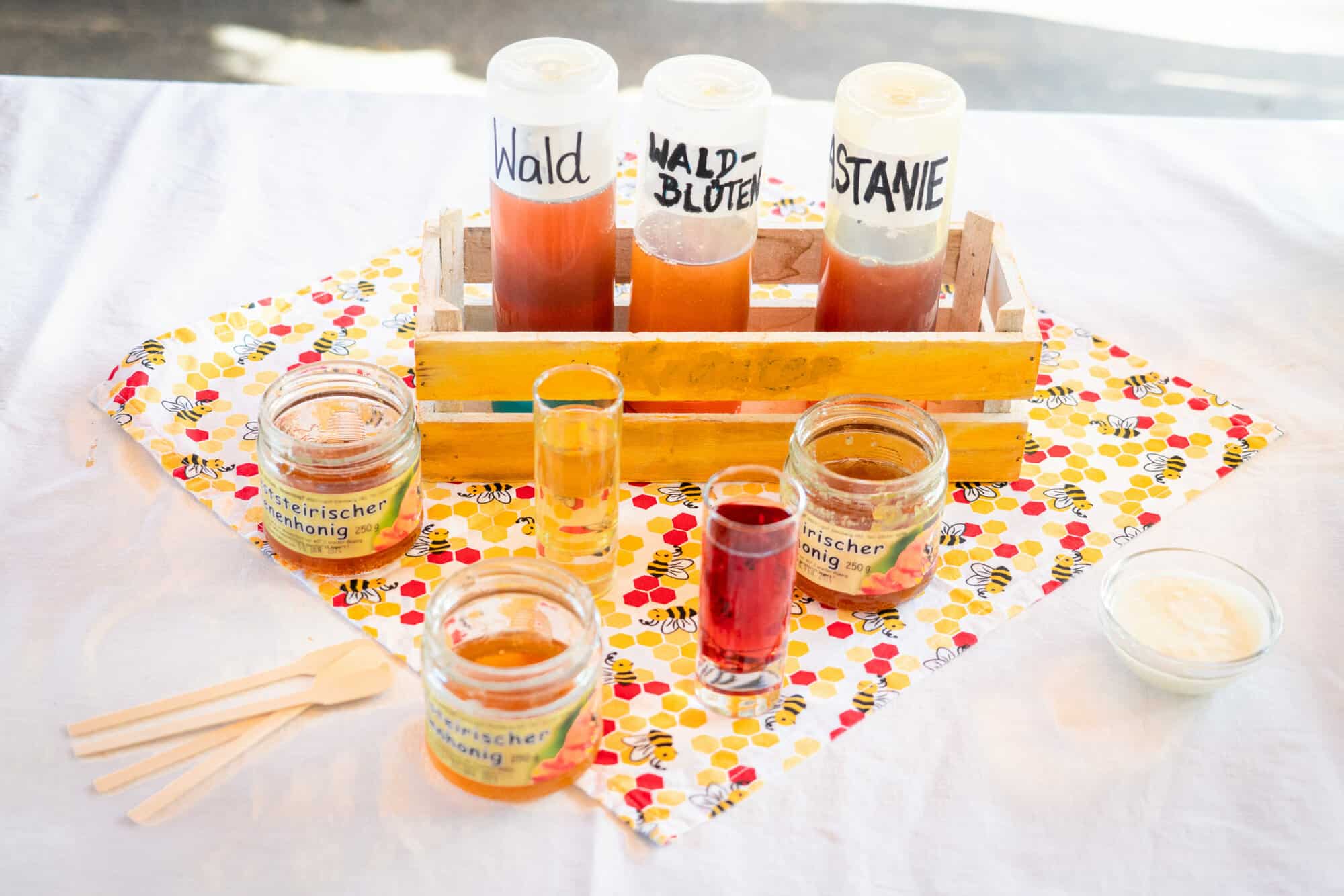
Tasting homemade honey – part of slow travel in Austria
The Land of Milk & Honey
Slow travel in Austria is big on supporting local producers. Take the Tax Dairy Farm, for example, which makes its own cheese.
Or the Rosenkopf beekeepers with their homemade honey.
While you can seek out products like these in the cities, with the smallest producers, you have to head out to the countryside and pay them a visit.
Plus, it’s cool to see inside the hives and learn about beeswax in an idyllic setting.
Sigmund & Gisela Rosenkopf introduced us to their passion project through a honey tasting session. Amid talks about Queen Bees and Royal Jelly, we dipped bread into chestnut, floral and forest honey, each flavour unique to the positioning of the hive.

Quirky and beautiful: St Barbara’s in Bärnbach
Secret Attractions: The Quirky Church
St. Barbara’s Church in Bärnbach rises out of its quiet village with a flamboyant sense of occasion. Redesigned by the Austrian architect Friedensreich Hundertwasser, the church carries symbols from all the main religions in a strikingly unusual take.
It’s the kind of quirky surprise discovery that slow travel in Austria reveals to those who take the time to leave the cities and look around.
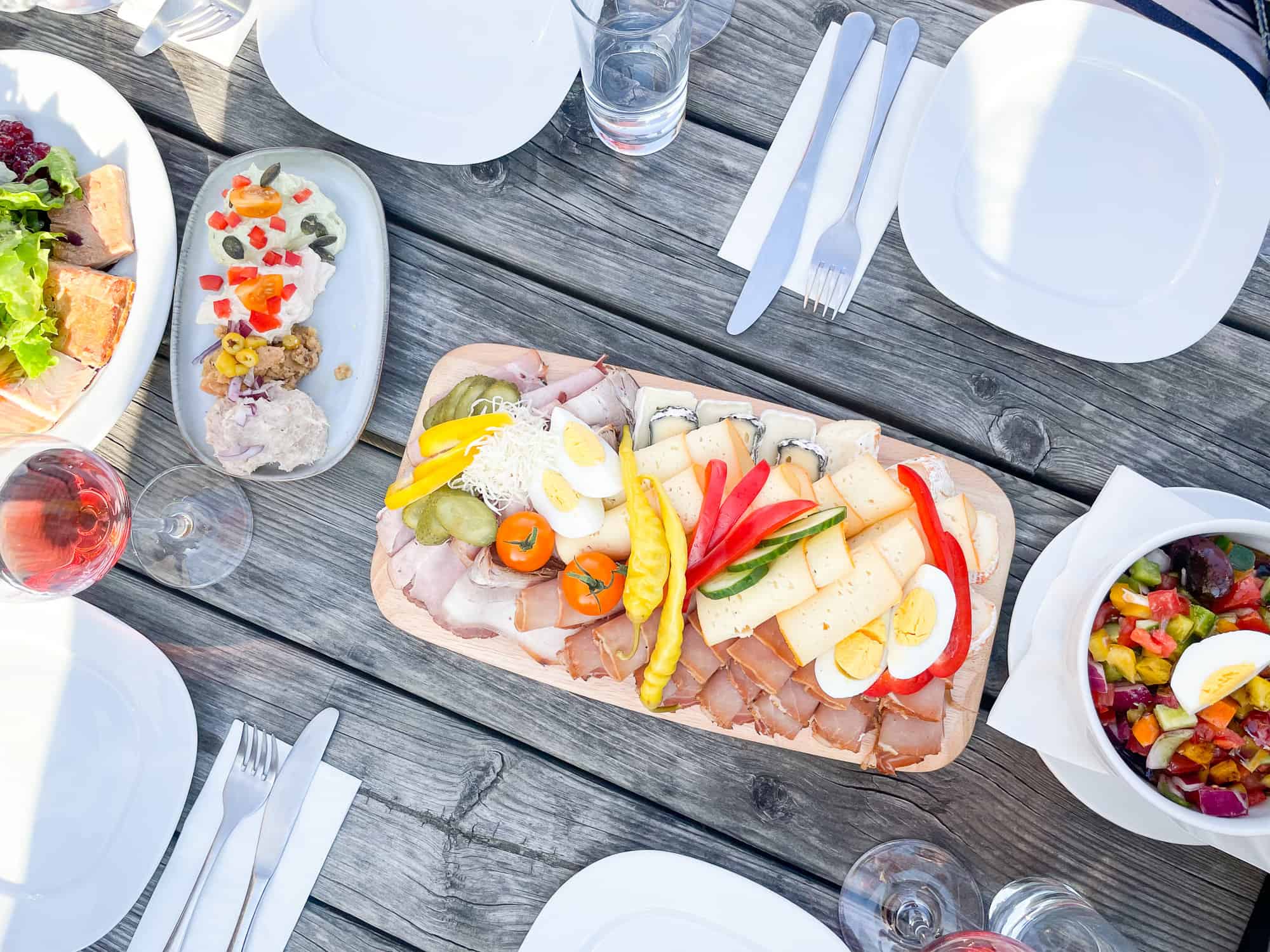
Brettljause platter at the Kremser-Greitbauer Buschenschank
The Buschenschank – Foodie Heaven
Ah, the beautiful, beautiful buschenschank! To the uninitiated, Styrian buschenschank are a slice of paradise set in the mountains. As an Austrian invention that is somewhere between a British pub and an organic farm shop, the buschenschank can only sell local produce.
This perfect example of slow travel in Austria dates back to a tax law written by an Emperor centuries ago rather than a new trend in the name of sustainability. In 1784, Emperor Joseph II allowed winegrowers to sell home-made products without a license to get past some other piece of tricky legislation.
But the end result is the same: high quality, sustainable produce. With stunningly beautiful view.
Enjoy the sun set with a glass of Schilcher Rosé wine, a western Styrian specialty you won’t find anywhere else in the world.
Here are some personally tested recommendations:
- The Buschenschank Kremser-Greitbauer
- The Schauer Winery in Kitzeck
Read more about the Styrian buschenschanks here.
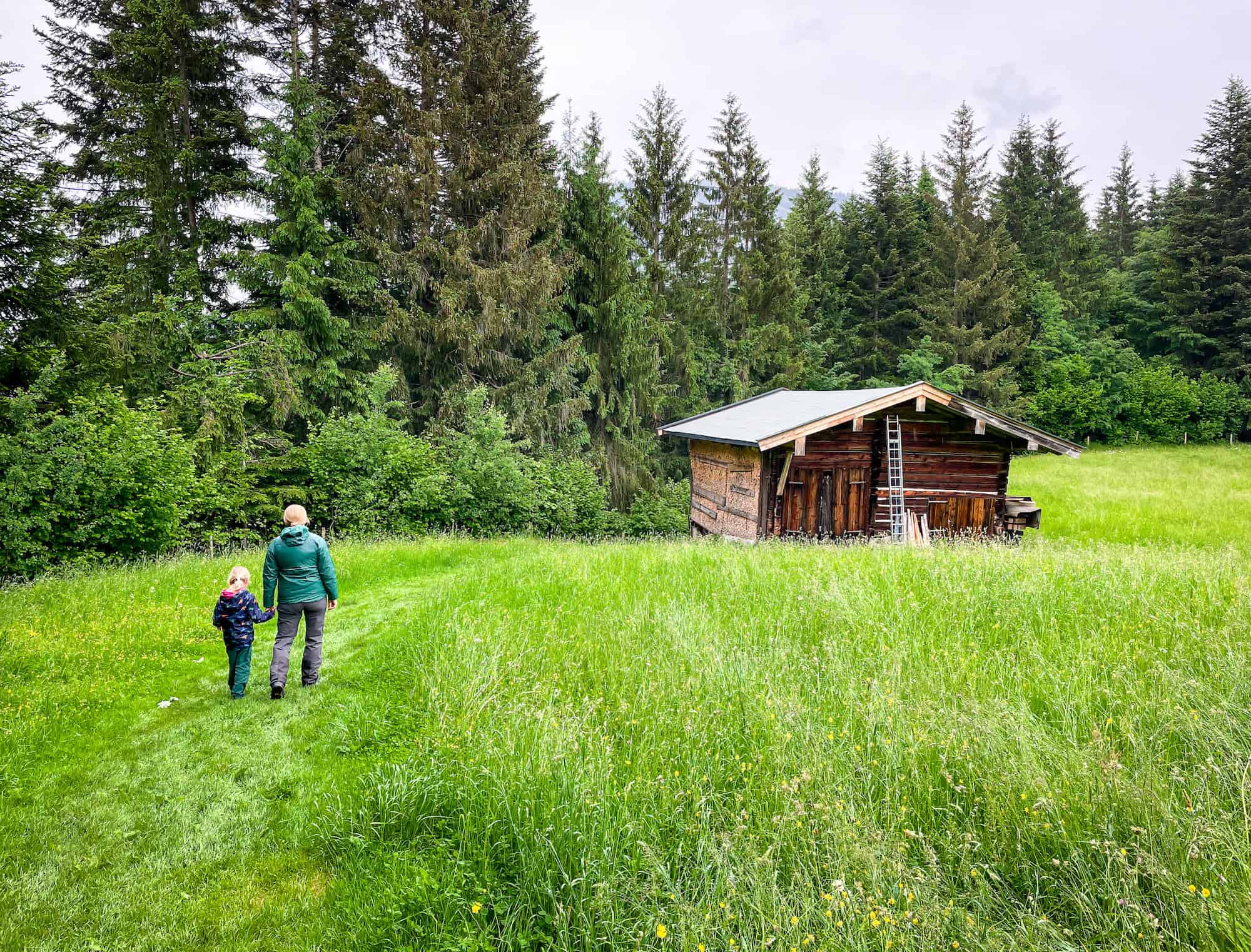
It’s always good to go hiking in Austria…
Hiking and Cycling Galore
It wouldn’t be travel in Austria, never mind slow travel in Austria, without talking about hiking and cycling. Never mind the hills being alive with the sound of music. It’s the sound of lycra that you can rely on. But I guess it’s less tuneful.
Graz has hundreds of opportunities in this regard, but for a gorgeous day trip hike from the city, climb Schöckl Mountain.
Where to Stay in Graz
One core part of slow travel involves staying in locally owned places. By sleeping in hotels and guesthouses with strong connections to the community they’re in, there’s all the more chance that your visit will be a force for good for the area.
And in Graz, you’ll find several family run hotels. Here’s where I’d recommend:
- Hotel Gollner – close to the Old Town, quiet and with a modest roof terrace
- The Grand Hotel Wiesler – cool, design focused place near the Friendly Alien
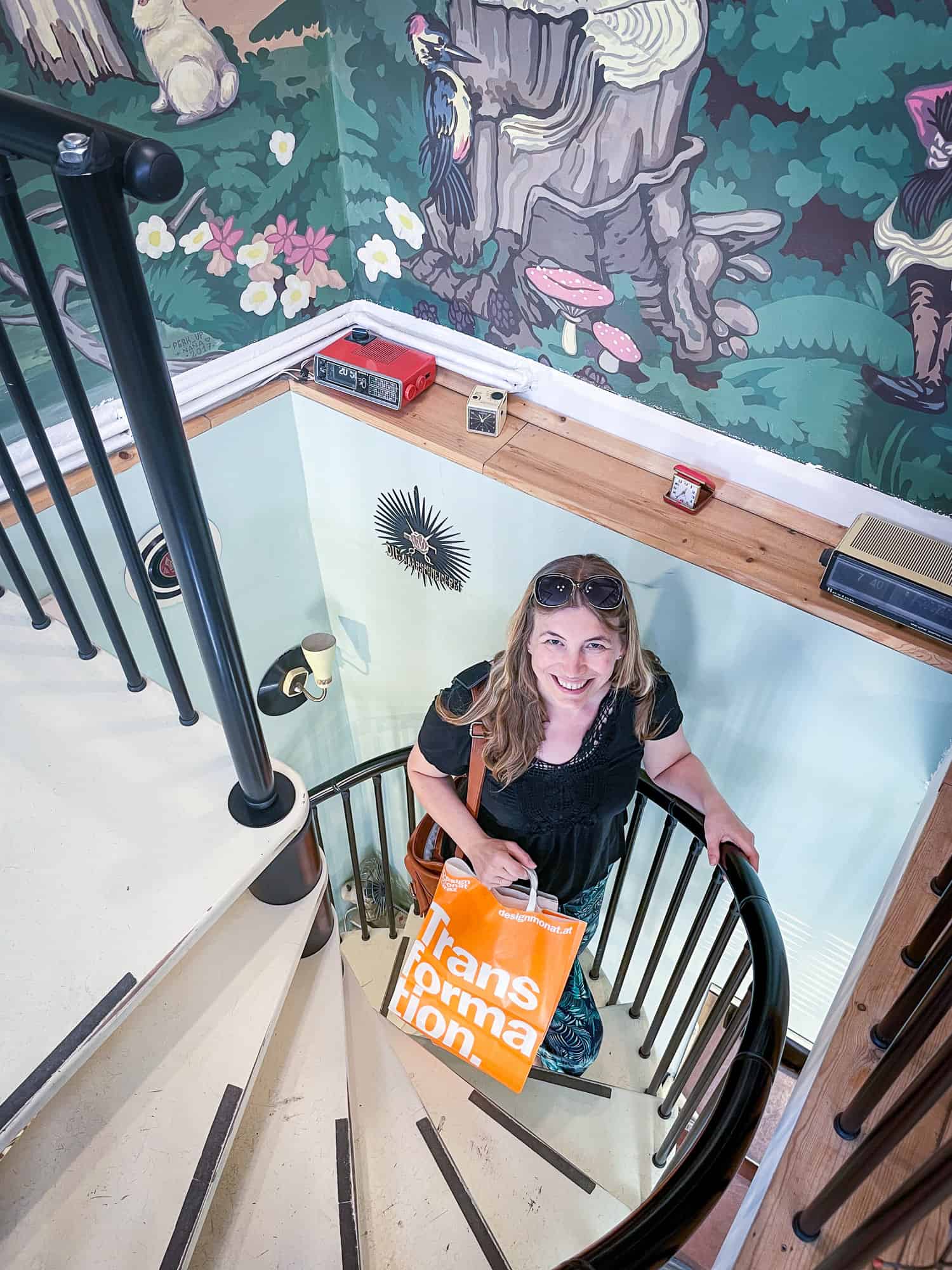
Slow travel in Austria involves many different things…
What Slow Travel is Not
- Taking months to get anywhere
- Camping in the woods
- Wearing a sackcloth
- Being miserable to make a point
Well, OK, so some of those points apply to slow travel in Austria. But only if you want to. You don’t have to do all of those things in order to travel slow and make a difference!
More Travel Articles about Austria
- Why summer in Austria is good for you
- Unique things to do in Graz, Austria’s city of design
- The 10 traditional Austrian dishes everyone should try at least once
- How to enjoy summer in Lech in Austria
- The secrets of the Cheese Road in Austria
- The best places to eat in Graz, Austria’s culinary capital
- Buschenschank Steirmark. Tricky words, great concept
- Dark tourism in Vienna: is it ethical
- Why St Johann in Tirol is Your Secret Tonic this Summer
- The best things to do in Innsbruck (plus an itinerary
- How to plan the perfect one day Graz itinerary
- The 15 most beautiful lakes in Austria

